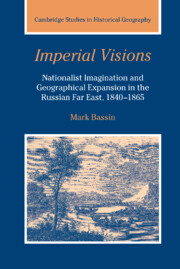 Imperial Visions
Imperial Visions Book contents
- Frontmatter
- Contents
- Foreword by Nicholas V. Riasanovsky
- Acknowledgments
- Map of the Russian Far East (c. 1860)
- Introduction
- Part I
- Part II
- Introduction
- 5 Dreams of a Siberian Mississippi
- 6 Civilizing a savage realm
- 7 Poised on the Manchurian frontier
- 8 The Amur and its discontents
- Conclusion
- Bibliography
- Index
- Cambridge Studies in Historical Geography
6 - Civilizing a savage realm
Published online by Cambridge University Press: 06 July 2009
- Frontmatter
- Contents
- Foreword by Nicholas V. Riasanovsky
- Acknowledgments
- Map of the Russian Far East (c. 1860)
- Introduction
- Part I
- Part II
- Introduction
- 5 Dreams of a Siberian Mississippi
- 6 Civilizing a savage realm
- 7 Poised on the Manchurian frontier
- 8 The Amur and its discontents
- Conclusion
- Bibliography
- Index
- Cambridge Studies in Historical Geography
Summary
“For the good of all Slavdom”
In the seventeenth century, Russian interest in the Amur region was fixed above all else upon its agricultural potential. Although the area had come to represent much more than this by the time it was incorporated into the Russian empire some two centuries later, the vision of a Siberian river valley that was uniquely endowed with a moderate climate and splendidly fertile soils still retained its essential appeal, and the hopeful anticipation persisted that it would become a thriving center of agricultural production. Those who reported back to European Russia about the region in the mid-nineteenth century often spoke to this point, describing at length the auspicious physical–geographical conditions on the Amur and the bright prospects for agricultural settlement there. The climate was “warm and healthy” and the soils were “extraordinarily fertile,” noted one observer, such that not only grains of all sorts but orchard fruits, berries, and even extremely delicate plants such as tobacco and grapes could be cultivated there. In the best locations along the Amur, suggested another, agriculture would be free from the frosts, droughts, and other climatic intemperances that plagued European Russia. To convince the most stubbornly sceptical readers of the potential of this cornucopia, he described the huge arbuzy or watermelons that grew wild for the taking along the river.
- Type
- Chapter
- Information
- Imperial VisionsNationalist Imagination and Geographical Expansion in the Russian Far East, 1840–1865, pp. 174 - 205Publisher: Cambridge University PressPrint publication year: 1999


